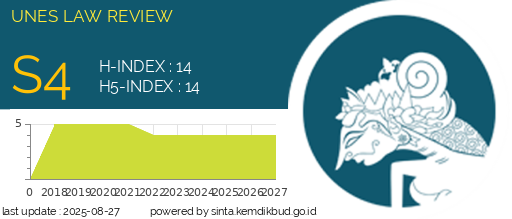PERTIMBANGAN HAKIM DALAM PENYELESAIAN SENGKETA TANAH PUSAKO TINGGI (Analisis Putusan Nomor 32/Pdt.G/2020/PN. Pdg)
DOI:
https://doi.org/10.31933/unesrev.v4i4.281Keywords:
Consideration, Dispute Resolution, Pusako LandAbstract
Inheritance property is anything left by a person who dies whether the property belongs to him or belongs to someone else. According to INPRES No. 1 of 1999 concerning the Compilation of Islamic Law (KHI) article 171 paragraph a Inheritance law is the law that regulates the transfer of ownership rights to the inheritance (tirkah) of the heirs, determining who is entitled to become heirs and how much of each. Socio-economic and cultural changes have shifted people's perspective on the world, including their orientation and views on the Minangkabau social system, touches of modernization with a capitalist economic style. However, it is related to inheritance and property ownership issues, usually assets are inherited by mamak (uncle) to nephews (sisters) or maternally, by pressing economic needs and changing views on property. This makes a conflict or dispute over inheritance, namely the high pusako land in a tribe or tribe in Minang-Kabau. The problems discussed are, first, how is the judge's consideration in resolving the high pusako land dispute? second What are the legal obstacles in the settlement of the high pusako land dispute? The approach method used in this study is the author uses a normative juridical approach to the problem under study, namely the decision Number 32\Pdt G/2020/PN.Pdg.
Downloads
References
Yoserizal, SH.MH, Ketua Pengadilan Negeri Padang, Laporan Tahunan Pengadilan Negeri Padang Tahun 2021, hlm. 1.
Ahmad Fadlil Sumadi, Pengawasan dan Pembinaan Pengadilan Fungsi Manajemen Mahkamah Agung Terhadap Pengadilan di Bawahnya Setelah Perubahan UUD 1945, Setara Press, Malang, 2013, hlm. 73.
Downloads
Published
How to Cite
Issue
Section
License
Hak cipta :
Penulis yang mempublikasikan manuskripnya di jurnal ini menyetujui ketentuan berikut:
- Hak cipta pada setiap artikel adalah milik penulis.
- Penulis mengakui bahwa UNES Law Review berhak menjadi yang pertama menerbitkan dengan lisensi Creative Commons Attribution 4.0 International (Attribution 4.0 International CC BY 4.0) .
- Penulis dapat mengirimkan artikel secara terpisah, mengatur distribusi non-eksklusif manuskrip yang telah diterbitkan dalam jurnal ini ke versi lain (misalnya, dikirim ke repositori institusi penulis, publikasi ke dalam buku, dll.), dengan mengakui bahwa manuskrip telah diterbitkan pertama kali di Jurnal UNES Law Review.



















